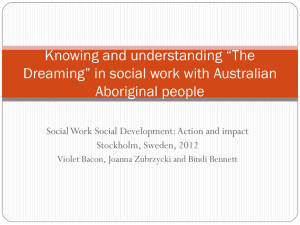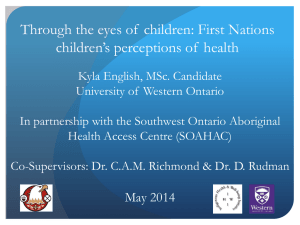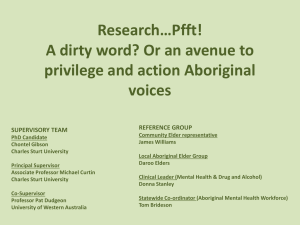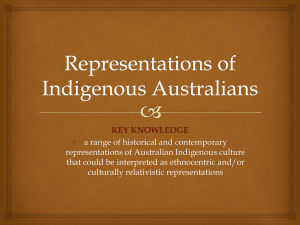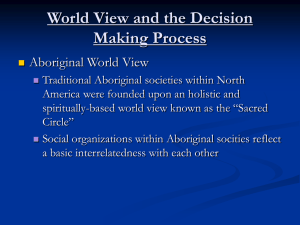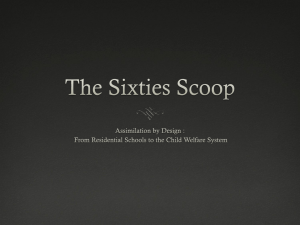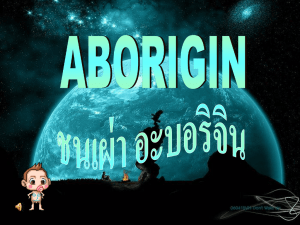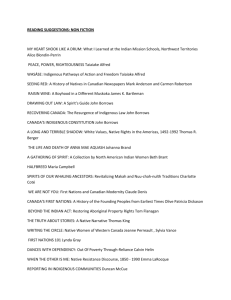Powerpoint - Australian Curriculum Studies Association
advertisement
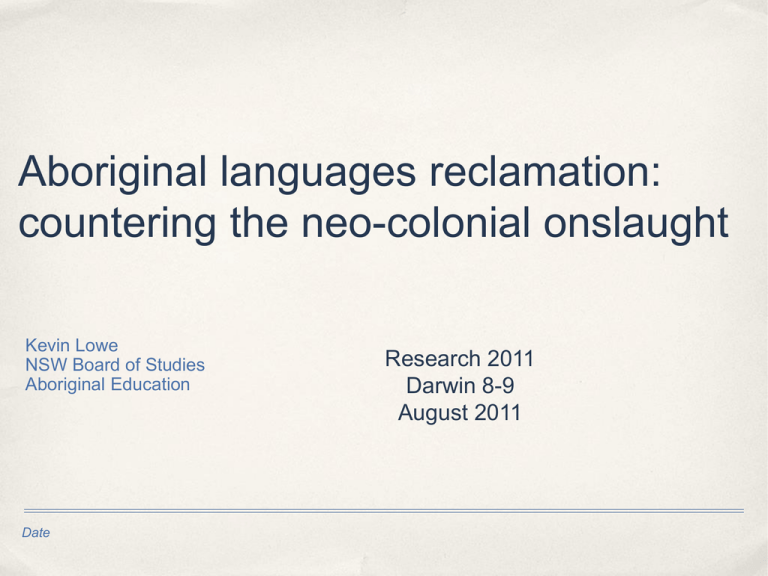
Aboriginal languages reclamation: countering the neo-colonial onslaught Kevin Lowe NSW Board of Studies Aboriginal Education Date Research 2011 Darwin 8-9 August 2011 Yarning: an Aboriginal languages parable Date Aboriginal identity ✤ Our Australian languages confirm peoples’ place, their culture and their nation. ......, it is important that everybody learns our languages, so that there is a greater appreciation of who we really are and what holds us together. (Language teacher, 2004) ✤ .. it’s all about the connection, not whether it is stronger or weaker, .... the whole point of that connection is that its going to put me on a path that empowers me. It makes me feel a stronger identity to whom I am as a person and this is connecting me to something beyond where I am now....... If you can't connect then you are not going to identify. (Language teacher, 2007) Indigenous culture and mainstream Education ✤ [Culture] – provides an implicit and explicit context within which people operate and make sense of the world. It influences how people and communities process learning, solve problems, interpret the world and structure the teaching of the next generation. (Banks, Banks & McGee (1989) ✤ If cultural affiliation provides a central context to student’s learning, then it is essential for curriculum and pedagogic practices to both link, reflect and be explicitly acknowledged . ✤ Dominant colonial cultures are essentialist, pervasive and normalising of dominant histories, experiences, institutions, knowledge and ways of knowing. Challenging colonial cultural dominance “…When I come here and I was shocked because I saw this living part of my culture being called an artefact by my own countrymen who basically don’t have the critical faculties to be able to stand within their own ethnic standpoint and say “hey, this [English] language is killing me, all these words in this foreign language that I’m using is killing me, they’re placing me as a stone age person who’s culture’s finished and who’s going to be wiped out”. (Aboriginal consultant, 2007) Language and schools It’s bringing back our history, our language, our culture. It’s reviving that and we’re passing it on to our younger generation because we knew it was going to be lost. ...[my brother and] I have been working on it for the last ten years (Community elder and teacher) ..Well if you are teaching language in a school, you have to work in with a schoolteacher to a timetable in that curriculum, that's the way schools function, that's their formula. But that formula isn't going to bring out that experience that I'm talking about in a child because it loses the main idea of what I'm saying to you because school has it's place but it isn't the place ...(language mentor and teacher). Murray Butcher - Wilcannia Language and cultural reclamation ✤ Bilingual schools support and enhance all that we Indigenous people have fought for over time to preserve our independent cultures and identities. Our cultures and our languages are our human rights, protected under international treaties. Tom Calma ✤ Language work is by its nature, is at the vanguard of opposition to dominant political, social and economic policies ✤ Insistence of English first policies elevates English above all other languages. ✤ The power - institutions and concepts of position, place and authority ✤ it problemitizes culture and linguistic difference by degrees of resistance, deficit ✤ current policies constant internal tensions of position, relationship of state to Aboriginal people - self determination, treaty, terra nullius, human rights, collaboration VS intervention, land rights /native title ✤ seeks to suborn Indigenous agency to this task - policies that undermine embeds a monolingual/cultural state Contemporary environment of language reclamation ✤ ‘reclaiming language’ - questions about the language and meaning ✤ embedded tension of being described as dysfunctional, being in linguistic moribundity, a victim of community disinterest - Aboriginal community’s disinterest in part the cause of its ‘decay’ ✤ impact of the relationship between Aboriginal communities and language experts - recognising Indigenous agency with need for linguistic. Collaborative ✤ The rebirthing of authentic Indigenous voices onto the landscape is central to their identity agency and self determination Situating language reclamation ✤ genuine engagement with language reclamation requires a new world view for both Indigenous and non-Indigenous peoples - the spinal cord to diverse environments, purposes and outcomes. These include: ✤ pedagogic practiced (Bernstein) ✤ curriculum (Apple, McCarthy, Ladson-Billings) ✤ relationships (Epstein) Dianne McNaboe - Dubbo Pedagogy ✤ effective language education requires critical and responsive pedagogy: ✤ acknowledges the nature of disadvantage ✤ challenges ✤ ✤ ✤ systemic as well as deficit thinking about student capacities, aspirations ✤ hegemonic practices, structures and policies - esp those that problematise Aboriginal knowledge understands the highly contested nature & place schools within economic, social, cultural & political A Critical Indigenous model focuses on ✤ privileges Indigenous epistemologies and ontology ✤ centres community languages and cultures within ✤ is culturally responsive ✤ based on student: success, cultural connectedness, critical consciousness Curriculum ✤ Dominant status groups and social classes use their power to maintain and create structural conditions to protect their interests. ✤ Accordingly, schools are fashioned to guarantee the success of students from privileged groups through a curriculum that privileges cultures, aspirations, needs, interests and knowledges, and teaching processes ✤ The primary structure of school control centres on mandated curriculum and its localised delivery - its privileged content, knowledge and assessment, and its delivery. [De Graff 2000] Curriculum ✤ current curriculum programs typically: ✤ fails to link dominant culture with destructive notions of race and to acknowledge systematic racism ✤ perpetuates underachievement by situating school curriculum and teaching practices within the broader socio-political & social justice debate ✤ are underpinned by policies of epistemological assimilation - fails to critically investigate notions of invasion, systemic disadvantage or legitimacy of Aboriginal experience or knowledge ✤ fail to acknowledge that curriculum is deeply embedded with pedagogic practices that fail to acknowledge Indigenous difference Language and Culturally responsive curriculum Culturally responsive education • ✤ ✤ Students need to feel valued so that they are able to develop positive self esteem. Teachers must demonstrate that they care for students as cultural human beings. Teachers who demonstrate they value cultural experiences of students will have greater success in building successful relationships. Learning through culture ✤ ✤ ✤ It is essential that cultural experiences connect cultural experiences to both the content and practices in the classroom. Providing access to high quality language programs taught by community language teachers is acknowledged as a highly effective strategy. knowledge ownership and the need to develop trusting, deep, personal relationships between teachers and community. Cultural responsiveness and transformed curriculum ✤ Through: critically evaluating curriculum and teaching practices to ensure relevance, engagement and cultural connectedness. ✤ Cultural knowledge must be central to the program by being embedded. Partnerships ✤ Educational partnerships - aspirational connection between schools, teachers and parents/communities have been shown to: ✤ ✤ improve student engagement and achievement ✤ sustain social cohesion ✤ effect change in teacher understanding of community aspirations ✤ develop two-way capacity building project for schools and parents Problematic history - tokenistic / ephemeral to school business. Few programs built on genuine engagement in the teaching and learning space. ✤ It is argued that schools have played a central role in perpetuating educational disadvantage and systemic racism has had the effect of minimising community engagement. Languages programs and genuine Post-colonial discourse ✤ Genuine and purposeful collaboration between empowered parents and culturally aware teachers provides a powerful platform to fundamentally move schools towards sustainable partnerships. Concluding thoughts .. ✤ There are impediments - some of these are deeply structural and go to the heart of colonising discourse. ✤ To implement effective and sustainable programs, there needs to be ✤ ✤ respect from schools that centres Aboriginal cultural knowledge within a responsive and quality educational framework. It must effect - ✤ curriculum development and implementation, teaching practices and school resourcing. ✤ motivated leadership Developing trusting, reciprocal relationships ✤ genuine engagement

